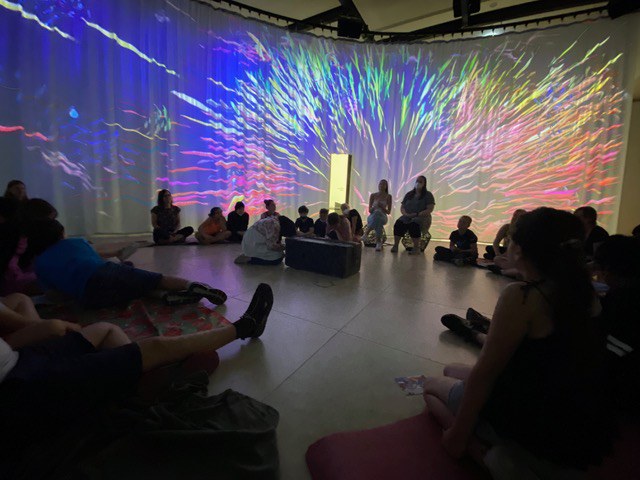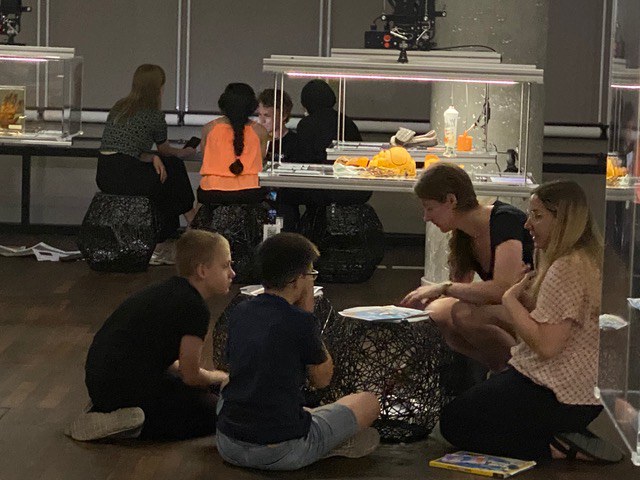The students of Petra Anders, Professor of German Teaching and Didactics at the Institute of Educational Sciences, have also developed ideas on how to appeal to pupils – in their case, fifth-graders at a primary school in Berlin-Reinickendorf. They embed the exhibition visit in a mixture of escape room narrative and treasure hunt. ‘We first take the pupils on an imaginary journey so that they can let go mentally. We end up stranded together on a desert island where researchers who have made certain discoveries live,’ explains the professor of German didactics. Two pupils at a time then work with an exhibit, for which the students also read excerpts from children’s books. At a display case with historical apple models, for example, the focus is on biodiversity. Another group has chosen a pangolin exhibit. Its conspecifics could no longer be exported from South America due to the pandemic, explains Petra Anders. ‘So a species threatened with extinction was saved by a crisis.’
The students have also prepared a station on Herder’s diary. ‘At first, there was a discussion as to whether children would even be interested in such a historical diary. But of course they read ‘Greg’s Diary’ and have lots of connections to the format.’ Based on the object, the students discuss the meaning of writing with the fifth-graders. Why do you record your thoughts to pass something on to posterity? ‘That was important because the teacher said that the children were very reluctant to write,’ says Petra Anders. At the end, the pupils solve puzzles about their station and receive a key. Together, they can use it to unlock the chains that are strung around a treasure chest full of sweets and souvenirs from the Humboldt Lab.
Both seminars are intended to enable students to try out their skills in a non-university and extracurricular environment and adapt to specific target groups. Many of the Reinickendorf students rarely leave their district, says Petra Anders. ‘They’ve never been to Alexanderplatz, Berlin Cathedral or the Humboldt Forum.’
But it’s not just schoolchildren who discover new things. ‘For me, the idea of being able to hold my seminar in a museum was incredibly appealing,’ says Petra Anders. After all, the students are not necessarily museum-loving either. Extracurricular places of learning regularly play a role in their studies. ‘However, organising such an educational programme in a museum is not an everyday occurrence,’ says Oliver Musenberg. ‘The fact that we were able to work surrounded by the artefacts in the Humboldt Lab was very special. It was the most intensive seminar I’ve given in a long time,’ says Petra Anders. This was made possible by the dedicated staff at the Humboldt Labor.
Nevertheless, there are ideas about what could work better next time. More time is needed to talk about solutions, not just crises, says Anders. ‘As a fifth-grader, I would probably have gone home and thought: What kind of world is this, so full of crises?’ It is important for the pupils to discuss possible small steps to get out of the misery.
The projects not only provide food for thought for pupils and students, the participating institutions also benefit from them. As part of the so-called third mission, universities are increasingly working on networking with other areas of society. ‘I think that the university should reach out into society and grow. For primary school teaching in particular, it is obvious that what we do is never negotiated in an ivory tower. We work together with schools and students also have to learn how to deal with extracurricular places of learning,’ says Petra Anders.
The projects are initially completed with the pupils’ visits to the exhibition. ‘However, the teachers immediately said that they would also like to come with the other two fifth-grade classes,’ says the seminar leader. She wants to develop a handbook based on the seminar and leave the concepts for the stations to those responsible at the Humboldt Lab.
Oliver Musenberg hopes that his seminar can provide ideas for making the Humboldt Labor more accessible as a cultural venue for target groups that have previously been less recognised. ‘For me, the idea of a third mission is centred on the Humboldt Labor picking up on ideas that would be important to appeal to people with learning difficulties,’ he says. Topics such as easy language are now very present in museums. ‘But there are many pupils with intellectual development difficulties who don’t benefit from easy language because they can’t read at all.’

